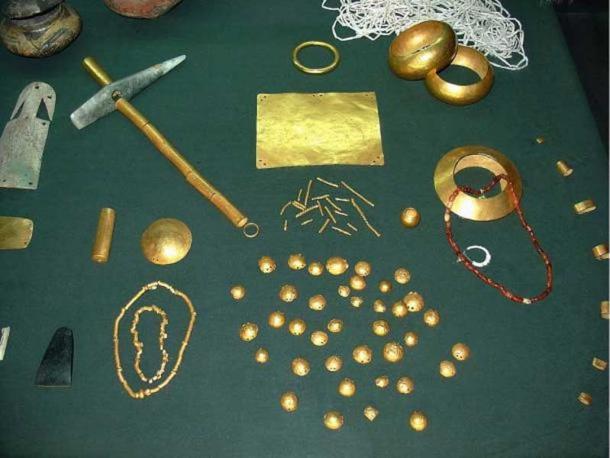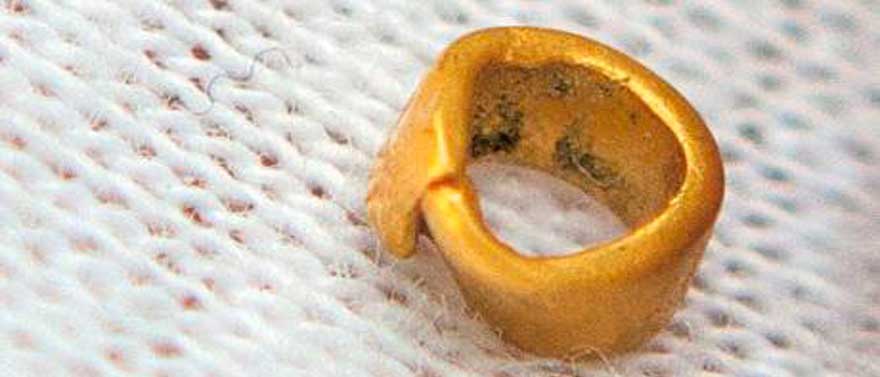6,500-year-old worked gold predates previous ‘oldest’
It may be just a tiny gold bead – 4 mm (1/8 inch) in diameter – but it is an enormous discovery for Bulgarian archaeologists who say they have found Europe’s – and probably the world’s – oldest gold artefact.
The bead, found at a pre-historic settlement in southern Bulgaria, dates back to 4,500-4,600 B.C., the archaeologists say, making it some 200 years older than jewellery from a Copper Age necropolis in the Bulgarian Black Sea city of Varna, the oldest processed gold previously unearthed, in 1972.
“I have no doubt that it is older than the Varna gold,” Yavor Boyadzhiev, associated professor at the Bulgarian Academy of Science, said.
“It’s a really important discovery. It is a tiny piece of gold but big enough to find its place in history.”
Boyadzhiev, believes the bead was made at the site, just outside the modern town of Pazardzhik, which he says was the first “urban” settlement in Europe, peopled by “a highly-cultured society” which moved there from Anatolia, in today’s Turkey, around 6,000 B.C.
“I would say it is a prototype of a modern town, though we can say what we have here is an ancient town, judged by Mesopotamian standards,” Boyadzhiev said.
“But we are talking about a place which preceded Sumer by more than 1,000 years,” he added, referring to what is usually considered the first urban civilisation, based in southern Mesopotamia, modern day Iraq.
The gold bead, weighing 15 centigrams (0.005 ounce), was dug up two weeks ago in the remains of a small house that would have stood at a time when metals such as copper and gold were being used for a first time.
The settlement unearthed so far is between 10 and 12 hectares (25-30 acres) and would have had a 2.8-metre-high (9-foot) fortress wall. Anything over 0.7-0.8 hectares is regarded as a town by researchers working in Mesopotamia, Boyadzhiev said.
More than 150 ceramic figures of birds have been found at the site, indicating the animal was probably worshipped by the town’s people. The settlement was destroyed by hostile tribes who invaded from the north-east around 4,100 B.C.
The bead will be exhibited in the historical museum in Pazardzhik once it has been thoroughly analysed and its age confirmed, a museum worker said.
As Ancient Origins reported in 2014, in the 1970s, archaeologists in Bulgaria stumbled upon a vast Copper Age necropolis from the 5 th millennium BC containing the oldest golden artifacts ever discovered near the modern-day city of Varna. But it was not until they reached grave 43 that they realized the real significance of the finding. Inside burial 43 were the remains of a high status male and unfathomable riches – more gold was found within this burial than in the entire rest of the world in that period.

Most people have heard of the great civilizations of Mesopotamia, Egypt and the Indus Valley, which are all noted for being the earliest known civilizations to feature urbanization, organized administration, and cultural innovation. But few have heard of the mysterious civilization that emerged on the shores of lakes of the Black Sea some 7,000 years ago in Bulgaria.
The Varna culture, as it has come to be known, was not a small and inconsequential society that emerged in a little corner of Bulgaria and disappeared quickly into the pages of history. Rather, it was an amazingly advanced civilization, more ancient than the empires of Mesopotamia and Egypt, and the first known culture to craft golden artifacts. Varna is also now home to the largest known prehistoric necropolis in southeastern Europe, which reflects a richness in cultural practices, complex funerary rites, an ancient belief system, and the capacity to produce exquisite and expertly-crafted goods. It has come to be known as the cradle of civilization in Europe.
Via Reuters and Ancient Origins
